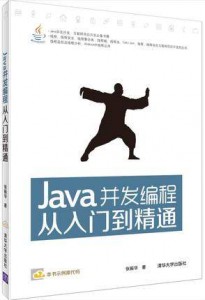《 Java并发编程从入门到精通》 Java线程池的监控
本文是《 Java并发编程从入门到精通》第9章 线程的监控及其日常工作中如何分析的9.1节 Java线程池的监控。
看不到不等于不存在!让我们来看看工作中是如何找问题解决问题的。
鸟欲高飞先振翅,人求上进先读书。
京东,亚马逊,当当均有销售。
9.1 Java线程池的监控
如果想实现线程池的监控,必须要自定义线程池继承ThreadPoolExecutor类,并且实现beforeExecute,afterExecute和terminated方法,我们可以在任务执行前,执行后和线程池关闭前干一些事情。如监控任务的平均执行时间,最大执行时间和最小执行时间等。这几个方法在线程池里是空方法。如:
//每执行一个工作任务线程之前都会执行此实现的方法
protected void beforeExecute(Thread t, Runnable r) {
//t – 放在线程池里面要执行的线程。
//r – 将要执行这个线程的线程池里面的工作线程。
}
//每执行一个工作任务线程之后都会执行的方法
protected void afterExecute(Runnable r, Throwable t) {
//r – 已经运行结束的工作线程。
//t – 运行异常。
}
//线程池关闭之前可以干一些事情;
protected void terminated() { };
线程池里有一些属性在监控线程池的时候可以使用:
- taskCount:线程池需要执行的任务数量。
- completedTaskCount:线程池在运行过程中已完成的任务数量。小于或等于taskCount。
- largestPoolSize:线程池曾经创建过的最大线程数量。通过这个数据可以知道线程池是否满过。如等于线程池的最大大小,则表示线程池曾经满了。
- getPoolSize:线程池的线程数量。如果线程池不销毁的话,池里的线程不会自动销毁,所以这个大小只增不+
- getActiveCount:获取活动的线程数。
大家想一想如果你来写的话如何去写,提供实例demo如下,慢慢体会一下:
public class MonitorThreadPoolExecutorDemo {
public static void main(String[] args) throws InterruptedException, ExecutionException {
Thread. sleep(500L);// 方便测试
ExecutorService executor = new MonitorThreadPoolExecutor(5, 5, 0L, TimeUnit.MILLISECONDS , new LinkedBlockingQueue() );
for (int i = 0; i < 3; i++) {
Runnable runnable = new Runnable() {
public void run() {
try {
Thread. sleep(100L);
} catch (InterruptedException e) {
e.printStackTrace();
}
}
};
executor.execute(runnable);
}
executor.shutdown();
System. out.println(“Thread Main End!” );
}
}
class MonitorThreadPoolExecutor extends ThreadPoolExecutor {
public MonitorThreadPoolExecutor(int arg0, int arg1, long arg2, TimeUnit arg3, BlockingQueue<Runnable> arg4) {
super(arg0, arg1, arg2, arg3, arg4);
}
protected void beforeExecute(Thread paramThread, Runnable paramRunnable) {
System. out.println(“work_task before:” + paramThread.getName());
}
protected void afterExecute(Runnable r, Throwable t) {
super.afterExecute(r, t);
System. out.println(“work_task after worker thread is :” + r);
}
protected void terminated() {
System. out.println(“terminated getCorePoolSize:” + this.getCorePoolSize() + “;getPoolSize:” + this.getPoolSize() + “;getTaskCount:” + this .getTaskCount() + “;getCompletedTaskCount:”
+ this.getCompletedTaskCount() + “;getLargestPoolSize:” + this.getLargestPoolSize() + “;getActiveCount:” + this.getActiveCount());
System. out.println(“ThreadPoolExecutor terminated:” );
}
}
运行结果如下:
work_task before:pool-1-thread-1
work_task before:pool-1-thread-3
work_task before:pool-1-thread-2
Thread Main End!
work_task after worker thread is :demo.thread.MonitorThreadPoolExecutorDemo$1@13bbe97
work_task after worker thread is :demo.thread.MonitorThreadPoolExecutorDemo$1@70125b
work_task after worker thread is :demo.thread.MonitorThreadPoolExecutorDemo$1@ceba90
terminated getCorePoolSize:5;getPoolSize:0;getTaskCount:3;getCompletedTaskCount:3;getLargestPoolSize:3;getActiveCount:0
ThreadPoolExecutor terminated:
原创文章,转载请注明: 转载自并发编程网 – ifeve.com本文链接地址: 《 Java并发编程从入门到精通》 Java线程池的监控
 作者:张振华 购买链接:
作者:张振华 购买链接:
 (4 votes, average: 4.50 out of 5)
(4 votes, average: 4.50 out of 5)

暂无评论